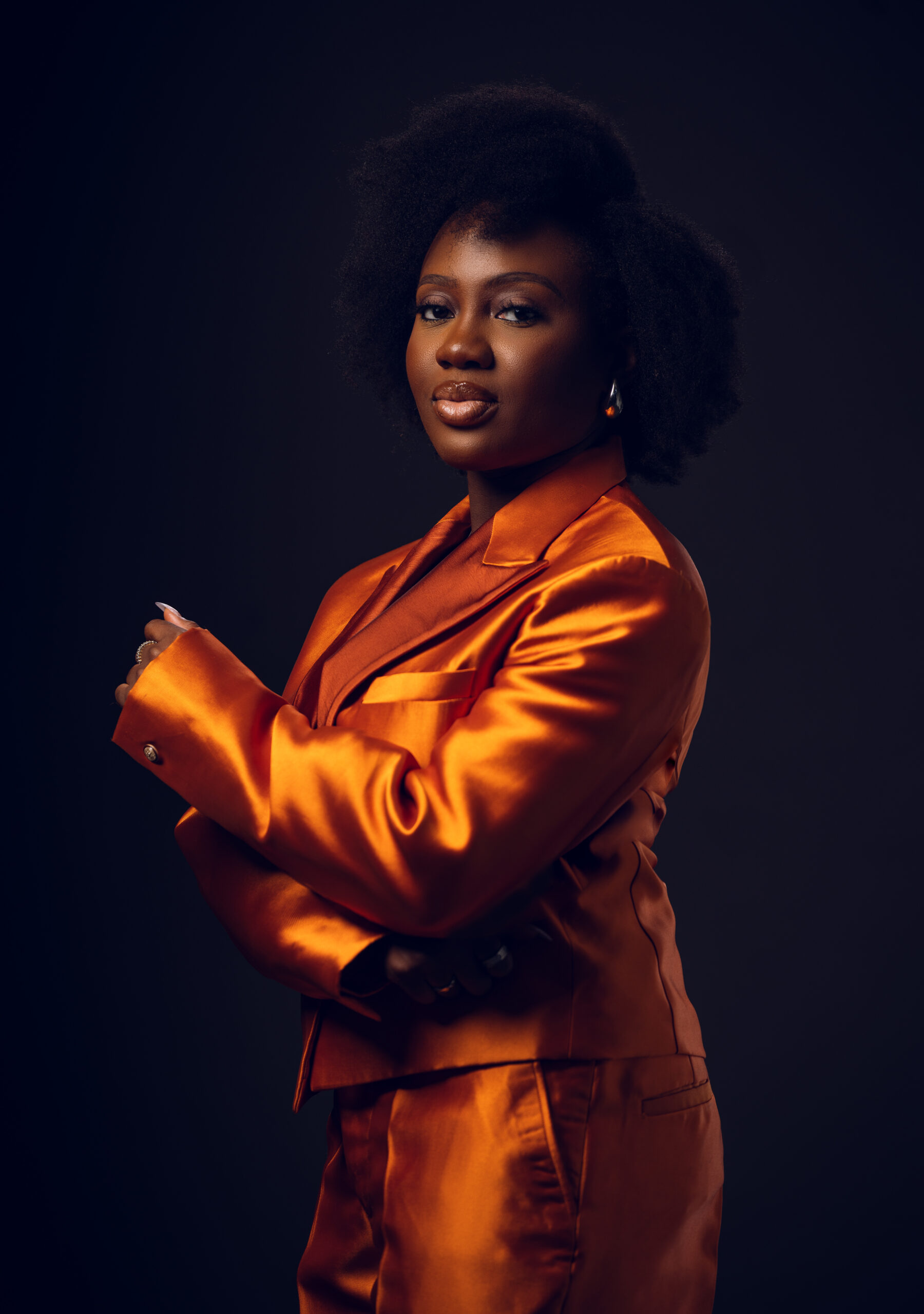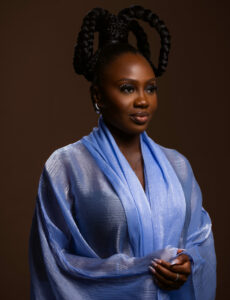The first time Adanna Madueke watched a young girl declare, “I’ll never relax my hair again,” she felt the magnitude of her work extend beyond tutorials and tips—it was about rewriting narratives. Adanna is not just a digital creator; she’s a filmmaker uncovering layers of African heritage and a natural hair advocate helping women embrace their roots, quite literally. Her journey has evolved into a movement, inspiring confidence and pride in natural hair and culture.
Growing up, Adanna faced her own challenges, grappling with racial discrimination and enduring painful myths surrounding natural hair. These experiences fuelled her journey, one that has blossomed into a global movement. Through her engaging videos and unfiltered content, she has built a community that empowers women to see their hair not just as strands but as a powerful symbol of identity, pride, and culture.
Adanna’s passion extends far beyond the digital space. Through her initiative, “Crown Revival,” she teaches young girls how to care for their natural hair while boosting their confidence and celebrating their natural beauty. Her documentary, “Our African Hairitage,” goes even deeper, taking viewers on an immersive journey across Africa to explore the emotional and cultural ties Africans have with their hair, while dismantling long-held stereotypes.
Her work is a celebration of authenticity and a bold reminder that beauty isn’t about fitting in—it’s about embracing who we truly are.
In this feature, Adanna dives into her creative journey, shares the compelling stories behind her projects, and her vision for the future of natural hair care.
***
Hey Adanna, how are you doing today?
I’m great, thank you so much! It’s always exciting to share my journey, and I’m thrilled to be here.
We’re happy to have you here also. Let’s talk about “Crown Revival’ which is such a great initiative. What motivated you to create this project?
Thank you! I strongly believe in the saying, “Catch them young.” Every young girl should know how to care for her natural hair and see it as a source of pride. That’s what the Crown Revival is all about—going into schools and teaching young girls the basics of natural hair care, like moisturising, protective styling, and detangling.
We also provide them with natural hair starter kits to kickstart their journey, which include products tailored to their hair needs. It’s not just about teaching them to care for their hair; it’s about instilling confidence in them and helping them embrace their natural beauty.
Working with young girls through your outreach programmes must be so rewarding. Can you share a moment that really touched you and made you feel proud?
Oh I have several moments of these. One of the heartwarming moments was during our maiden Crown Revival project when a young girl confidently declared, “I’m never relaxing my hair again because natural hair is our crown as Africans.” Her words brought tears to my eyes because that’s the essence of everything I’m trying to achieve.
Seeing these girls embrace their hair and heritage with pride reminds me why I started this journey. It’s about creating lasting impact, one girl at a time.
With your vibrant online community, you’ve seen firsthand how powerful these connections can be. What’s one story or interaction that really stood out to you?
One of the most touching experiences is meeting people in person who share how I’ve helped them fall in love with their hair and rediscover the joy of styling it. It’s incredibly humbling to know that my work has had such a positive impact on their lives.
I’ve also received heartfelt emails from individuals battling hair loss due to cancer or alopecia, telling me how my content has given them confidence and a renewed sense of self. These moments remind me of the deeper purpose behind what I do—it’s about empowering people to embrace their beauty, no matter their circumstances. These connections inspire me every day to continue this journey.
Walk us through your documentary, “Our African Hairitage,” was there a moment during that trip that shifted the way you view your own relationship with your hair and heritage?
Despite Africa being one continent, it’s fascinating to see how our diverse experiences with slavery and colonization have uniquely shaped our relationship with natural hair. Traveling through Nigeria, Kenya, and Senegal for the documentary was truly eye-opening. It was heartbreaking to witness how the lack of love and care for natural hair varies from one country to another, with some facing more challenges than others. Yet, this reality reignited my passion to celebrate and protect our hair.
One story that deeply resonated with me was from a woman I met in Senegal named Ko. She shared how she was pressured into relaxing her natural hair at a salon, a moment that deeply impacted her. Hearing her experience made me reflect on how fortunate I’ve been to embrace my hair fully and how vital it is to fight for this freedom—not just for myself, but for everyone.
So many people are taking the leap to go natural these days, but it can come with challenges. What do you think are the biggest challenges people face when starting their natural hair journey?
I think the biggest challenge is the misconception that natural hair is hard to manage, which is completely untrue. Unfortunately, some hair salons and stylists fuel this myth. I’ve heard stories of stylists convincing women that their protective styles won’t look good unless they relax or straighten their hair. Others outright refuse to work on natural hair, calling it ‘too difficult.’
Another challenge is the lack of access to quality hair products, especially in parts of Africa, which makes proper hair care much harder. For me, the root of these issues often comes down to a lack of knowledge. Imagine growing up without learning how to care for your hair—it’s no surprise that many grow to associate natural hair with pain or difficulty.
I still remember visiting Kenya, expecting to learn about local hair products and techniques, only to find a stylist with just water and a blow dryer. Everyone’s hair was dry, and the process of combing through it was painful. In such instances, it’s easy to see how people grow to dislike their hair.
That’s why education is so important, which is at the heart of our Crown Revival initiative. We go into schools to teach young girls how to care for their hair, providing them with the tools and products they need to succeed. My mission is to change the narrative and make the natural hair journey easier and more joyful for everyone.
There are still a lot of myths about natural hair out there. What’s one misconception you wish more people understood?
That natural hair is hard to take care of! It’s really not. All it takes is the right products, a simple routine, and a little patience.
For anyone just starting out, what’s one tip you swear by when it comes to maintaining healthy natural hair?
Moisture, moisture, moisture! Hydration is everything when it comes to healthy natural hair. Keep your hair moisturised by regularly spritzing it with water and sealing it with natural oils or butters—trust me, your hair will thank you!
Another tip: keep it simple. There’s no need for all the extra ‘gbo gbo ti gbo’ that can overwhelm you. A straightforward hydration and moisture routine is all our hair truly craves. Less is more!
If you could give your hair an African name, what would it be and why?
If I could give my hair an African name, it would be “Nkem” (Igbo for “Mine”). To me, this name symbolises ownership, pride, and personal identity. My hair is a reflection of my heritage, my journey, and my self-expression—something that belongs to me in its entirety.
Giving it a name like Nkem reinforces the deep connection I have with it and reminds me that my natural hair is not just a style but a part of who I am. It’s a celebration of embracing what’s truly mine.
What’s next for you? Are there any exciting projects or dreams you’re working towards that you can share with us?
So much is in the works! We’re planning to expand ‘Our African Hairitage’ and ‘Crown Revival’ to more countries, spreading the message of love and care for our natural hair. I also want to partner with governments and hair care brands to tackle health issues related to hair, like alopecia and hair loss due to cancer treatments.




